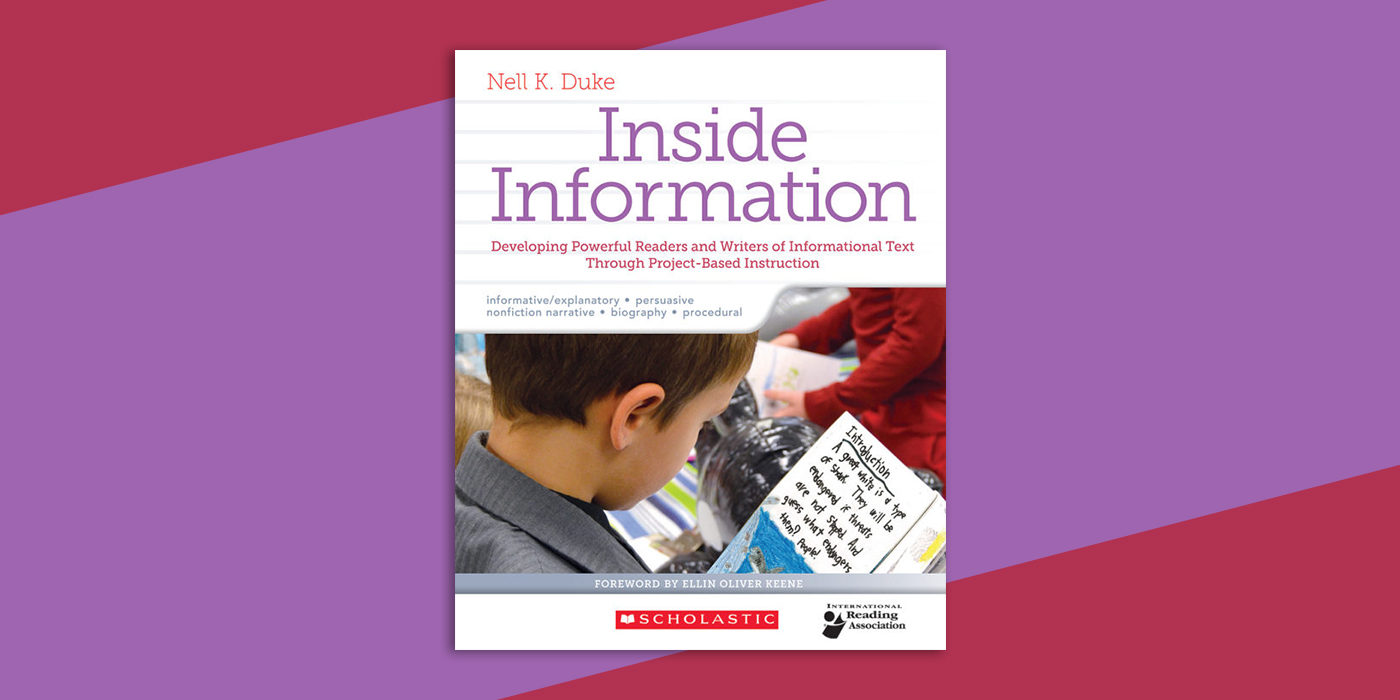Informational text has long been neglected in U.S. elementary classrooms. Although I welcome a move toward greater use of informational text, this move must be made carefully. In my book, Inside Information: Developing Powerful Readers and Writers of Informational Text Through Project-Based Instruction, I focus on an approach—project-based instruction—that I believe may help us to avoid many of the potential pitfalls of teaching informational reading and writing.
In a project-based approach, students work over an extended time period with a purpose that transcends satisfying a school requirement—to build something, to create something, to respond to a question they have, to solve a real problem, or to address a real need. For example, students might work to plan, plant, study, and cultivate a garden to help feed the hungry in their community; they might develop a guidebook for visitors at a nature preserve; they might study and then develop a plan to reduce waste in the school cafeteria; or they might research and develop an exhibit on an important historical event. Along the way, the teacher builds content knowledge and teaches skills that serve to help students meet their project goal (while from the teacher’s perspective also ensuring that the knowledge and skills address specific state standards, meet district curriculum requirements, and so on).
Although project-based approaches have been around for a long time, I believe these four benefits make the time especially ripe for using them to promote informational reading and writing achievement:
1. Project-based instruction is compatible with rigorous standards documents.
Project-based approaches are particularly well-suited to addressing the rigorous standards that involve informational text, such as the Common Core State Standards for English Language Arts and Literacy in History/Social Studies, Science, and Technical Subjects (National Governors Association Center for Best Practices & Council of Chief State School Officers, 2010) and the Next Generation Science Standards (CITE).
2. Project-based instruction builds 21st century skills.
The skills typically taught in project-based approaches are consistent with the so-called “21st century skills,” skills that are in demand for work and citizenship, such as those identified by the Partnership for 21st Century Skills, including:
• Creativity and Innovation
• Critical Thinking and Problem Solving
• Communication and Collaboration
• Flexibility and Adaptability
• Initiative and Self-Direction
• Social and Cross-Cultural Skills
• Productivity and Accountability
• Leadership and Responsibility
3. Project-based instruction nurtures stronger readers and writers.
Research is increasingly showing that project-based approaches, and their components, build students’ knowledge and improve their attitudes toward and skills required for learning. For example, in one study, a project-based approach to teaching social studies improved achievement not only social studies but in informational reading achievement as well. Moreover, project-based approaches often involve writing for audiences beyond members of the classroom. Research suggests that students actually write informational text better under those circumstances.
4. Project-based instruction is more motivating.
Many teachers view project-based approaches as more motivation than many traditional kinds of instruction. Although student engagement and motivation have always been important, they are more important than ever. Why? For one thing, standards expect much more from students than in the past. To get students to carry out the hard, cognitive work necessary to meet demanding standards, they need to be motivated and engaged in their learning.
Also, multimedia entertainment demands unprecedented competition for students’ attention. We simply have to make school more interesting for students than we have traditionally. Fortunately, we understand more than ever about how motivation and engagement affect learning and what practices motivate and engage students. Research has found that a number of motivational practices consistent with project-based instruction do foster motivation and achievement.
To learn more about project-based instruction, as well as effective strategies for putting it into action, see Inside Information: Developing Powerful Readers and Writers of Informational Text Through Project-Based Instruction, K–5: here.
About the Author
Nell K. Duke, Ed.D., is a professor in literacy, language, and culture and also in the combined program in education and psychology at the University of Michigan. She received her bachelor’s degree from Swarthmore College and her master’s and doctoral degrees from Harvard University. Duke’s work focuses on early literacy development, particularly among children living in economic poverty. Her specific areas of expertise include the development of informational reading and writing in young children, comprehension development and instruction in early schooling, and issues of equity in literacy education.
